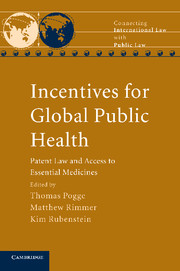Book contents
- Frontmatter
- Contents
- Contributors
- Series Editors' Preface
- Editors' Preface
- Introduction: Access to essential medicines: public health and international law
- Part I International trade
- 1 TRIPS and essential medicines: must one size fit all? Making the WTO responsive to the global health crisis
- 2 The TRIPS Waiver as a recognition of public health concerns in the WTO
- 3 Public law challenges to the regulation of pharmaceutical patents in the US bilateral free trade agreements
- 4 Global health and development: patents and public interest
- Part II Innovation
- Part III Intellectual property
- Part IV Healthcare
- Bibliography
- Index
2 - The TRIPS Waiver as a recognition of public health concerns in the WTO
Published online by Cambridge University Press: 04 August 2010
- Frontmatter
- Contents
- Contributors
- Series Editors' Preface
- Editors' Preface
- Introduction: Access to essential medicines: public health and international law
- Part I International trade
- 1 TRIPS and essential medicines: must one size fit all? Making the WTO responsive to the global health crisis
- 2 The TRIPS Waiver as a recognition of public health concerns in the WTO
- 3 Public law challenges to the regulation of pharmaceutical patents in the US bilateral free trade agreements
- 4 Global health and development: patents and public interest
- Part II Innovation
- Part III Intellectual property
- Part IV Healthcare
- Bibliography
- Index
Summary
Introduction
Patent protection for pharmaceutical products as mandated in the Agreement on Trade-Related Aspects of Intellectual Property Rights (‘TRIPS Agreement’ or ‘TRIPS’) of the World Trade Organization (‘WTO’) represents a potentially significant obstacle to public health measures, particularly for developing countries seeking to import medicines to deal with serious public health concerns, such as the HIV/AIDS crisis. Since 2001, WTO members have acknowledged this tension while working slowly towards a formal amendment of WTO rules that would facilitate compulsory licensing of pharmaceuticals for the benefit of least-developed country (‘LDC’) members, as well as other members lacking sufficient manufacturing capacity to use the existing flexibilities in the TRIPS Agreement in respect of public health. As the first shipment of drugs from Canada to Rwanda under the new arrangements has recently taken place (in September 2008), we take the opportunity to reflect on the steps taken to date within the WTO to resolve the patent/public health tension.
In section 2, we explain why WTO members needed to reform the TRIPS Agreement in order to improve access to medicines for public health reasons, before turning in section 3 to the temporary solution reached in the form of a waiver of certain TRIPS obligations. In section 4 we then consider the more permanent solution of a formal amendment that is envisaged for the future. This chapter then turns in section 5 to consider how the waiver has been used in practice.
- Type
- Chapter
- Information
- Incentives for Global Public HealthPatent Law and Access to Essential Medicines, pp. 56 - 76Publisher: Cambridge University PressPrint publication year: 2010
- 4
- Cited by



